The halfway point for modern Trek has historically always been the weakest point. Unlike syndicated Trek of yore, when you’re telling a season-long arc and you’re trying to start strong and finish strong, you often end up hung up in the middle trying to either answer questions from the beginning, or set up the pieces for the end. This week’s episode did a little of both, but apart from a wonderful interaction between Picard and another former Enterprise-D crewmen, the rest of the episode kinda fell a bit flat spinning on what we already know; Starfleet is compromised, just, like, way worse than we thought!
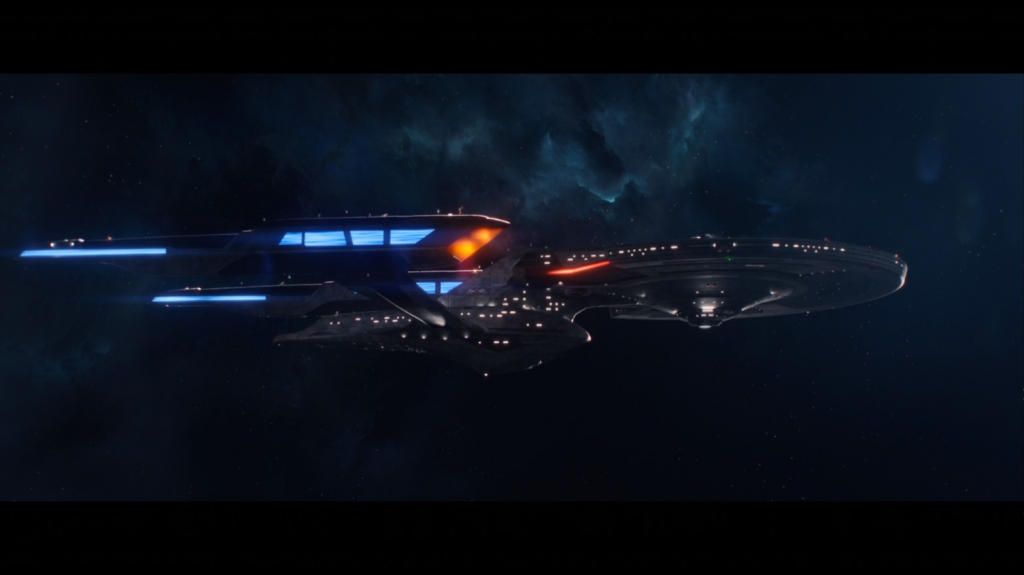
If a few of the hints from previous episodes didn’t tip you off that not all is right with Jack Crusher, this week reinforces that theme in a much larger way, complete with hallucinations and voices that kind of echo what we saw with Picard’s mother in the last season. Either Jack is dealing with the same kind of issue that plagued Picard’s mother in his youth, or there is an external force pressing on our poor dude. Meanwhile, our dear ol’ Captain Shaw, dry and witty as always, went ahead and signaled for a Starfleet ship to come and take Picard, Riker, and Seven away. I very much enjoy Shaw as a character, and his many quips about their various failures and misdeeds in the past offer both a counter-balance to the sort of hero worship they often try to brag about, and a very meta-dripping take on the fandom’s own hero complex of the TNG characters. But Shaw does not represent the Nu-Trekkie either, because if he did, he would be all about trying to insert himself into the action hero complex. Rather, he just wants to punch in and punch out, daily. Perhaps the meta there is that of a Paramount exec.
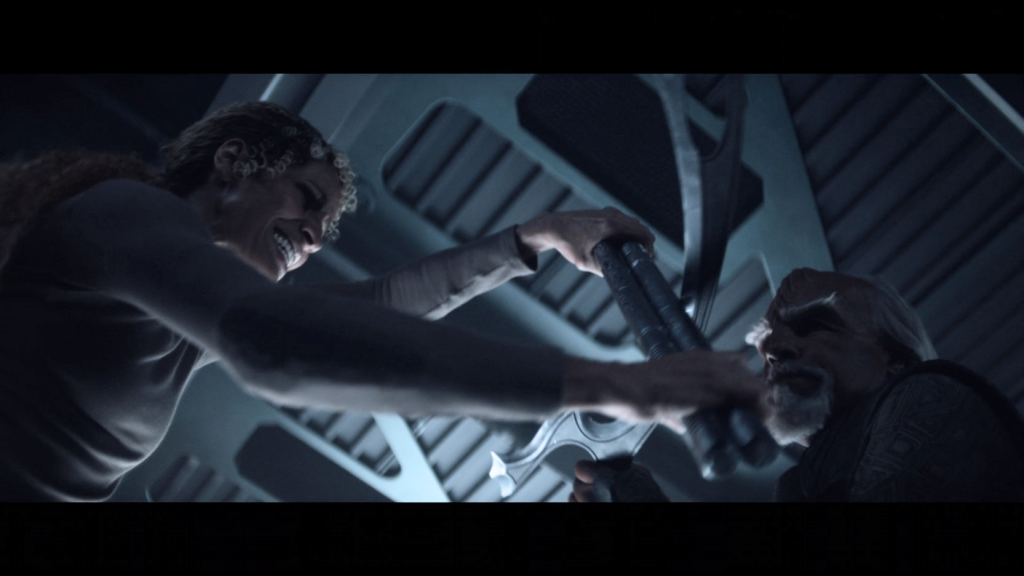
After their absence last week, our Power Duo Raffela and Worf continue their quest, but now this time it’s Worf’s Starfleet Intelligence hander who says not to try and seek out the Daystrom Institute for answers. Instead, they must pursue another means on M’Talas Prime. Up until the end of this episode, it felt like a sort of plodding B-plot, even if Our Man Worf was involved, but you’ll be glad to know that the streams finally cross as they learn of new information, and whom they can and cannot trust.
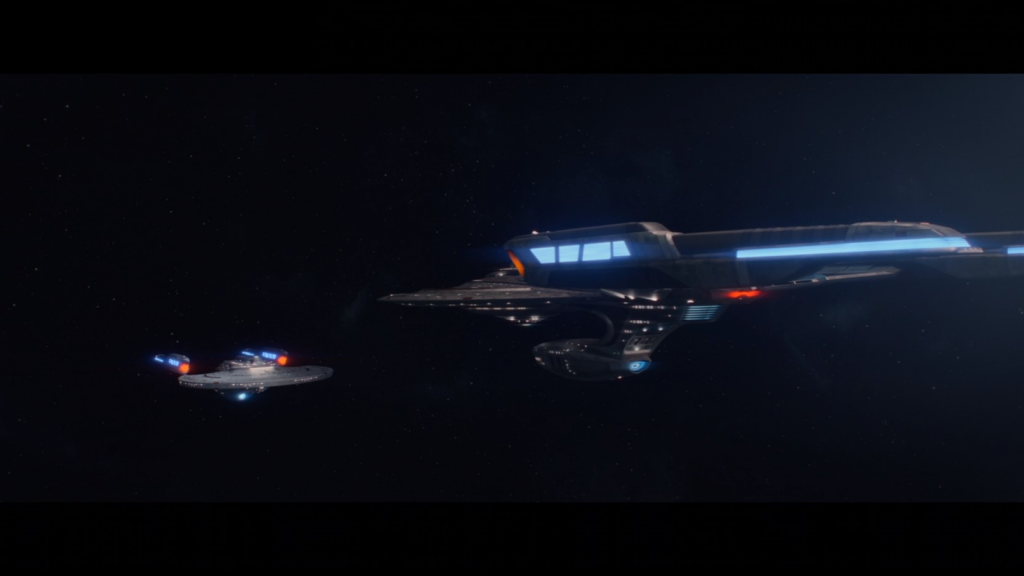
Shaw’s tattle-tale leads the USS Intrepid, which is not an Intrepid-class starship, to show up and make some interesting demands. What happens next is for the spoilers section, but as an executive summary, I will say this is easily the highlight of the episode, and a very good character performance by both actors. Though my only wrinkle, like with much of this series, is that it references things that happen in the thirty year gap that we don’t know, and they will not elaborate on further in a limited series. Hopefully books, comics, or other media will cover these stories.
Spoiler TalkSo someone on Twitter noticed with the last episode on a non-US streaming service that the subtitled directly referenced the Borg Queen as Jack’s voices in his head. That has some interesting implications if that turns out to be true, and calls into question if Borg nanomachines can be passed to the children of reclaimed Borg. I would have thought Beverly would have known about that or known what to look for sooner, but we will see if she will make that next logical leap now that he’s alluded to her everything is not alright after toasting four changelings, not knowing they were changelings. This could be why Vadic and the rogue changelings want him, but it’s also plausible that changelings were able to plant something in him, or maybe replace him earlier in life with a sleeper agent that is in the midst of activating. Something has to connect here soon on who he is, because he’s coming dangerously close to deus ex machina territory and that’s so overplayed in Nu-Trek.
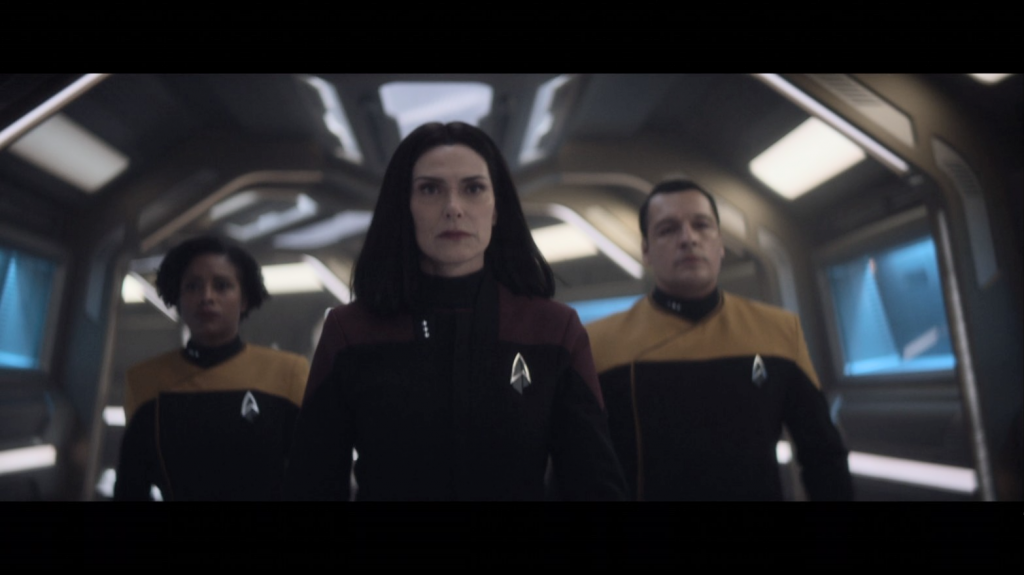
I admit, I very much did not expect Michelle Forbes’s Ro Laren to show up in this episode, or in Trek again, since her character’s defection to the Maquis in “Preemptive Strike”. Ro was originally intended to be Sisko’s Bajoran liason on Deep Space Nine, but Forbes turned the role down and it was reformed into Kira Nerys. At first I questioned why Ro, and even wondered if she was a changeling, but she actually was the perfect character test for Picard given the two character’s history. Here you had a Bajoran rebel-turn Starfleet officer whom he didn’t want on the Enterprise-D at the start because he was by-the-book and she wasn’t, but her skillset and tenacity proved herself many times, even when they both were turned into kids. Some of it felt a little forced to add a little more emotional weight to their scenes, but I didn’t really mind. I thought it was fantastic to see them both scoff at each other, and then reconnect on that personal level, before her sacrifice to try and buy time for the Titan to get away. Her turning out to be Worf’s handler in Starfleet Intelligence, and the communication linking both parties together at the end was a nice touch as well. Though it does raise a lot more questions on how deep the rabbit hole goes, and if there are members of Starfleet Intelligence who are also compromised. Or worse, Section 31.
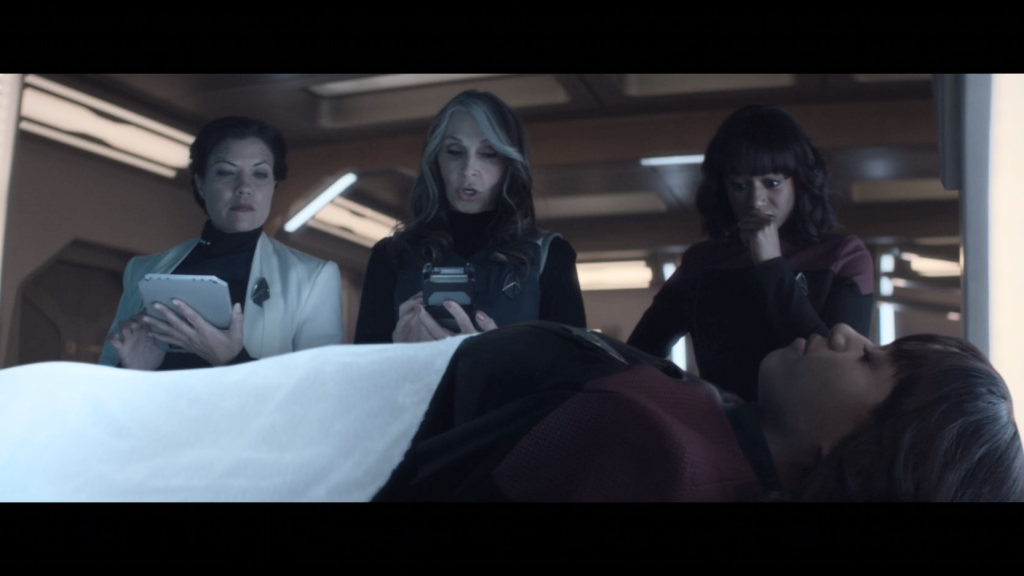
The new information that the changelings can now replicate organic matter and get around scanners placed after the Dominion War was an interesting tidbit, but not too far-fetched. You’ll recall when The Great Link punished Odo by “turning him into a solid” he in fact had organic everything until his changeling form was restored. So while this reveal makes for interesting television, as a trekkie you might be internally confused as to how Starfleet didn’t read any of Odo’s reports and consider this to be a potential factor over the next thirty years. Actually, they probably never read any of Odo’s reports.
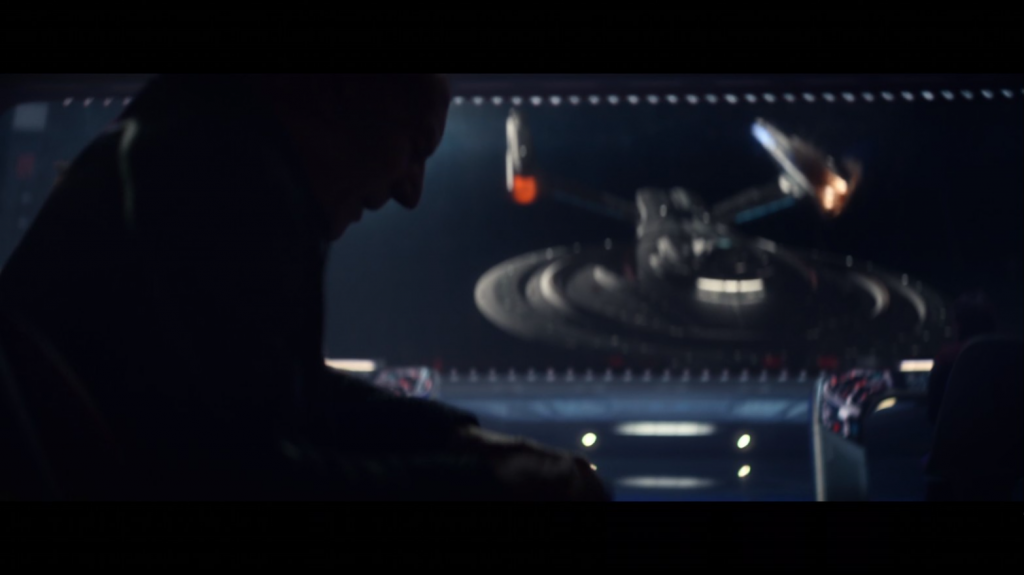
As for Ro’s sacrifice that cripples the Intrepid long enough for the Titan to escape, once again, the Picard series does away with another good legacy character just because. Hugh, Icheb, Ro, it kinda sucks a little because although it’s extremely unlikely we’d see any of them again in a live-action series, canonizing their deaths means the second-hand market won’t do anything with them either. It also just kinda feels like a cheap Tomino-style Gundam death. Even though we knew Ro Laren and of her interactions with the Enterprise crew, and her death does mean more than many, it’s like we were just brought in to say goodbye before the plug was pulled, and it feels fucking bad, man. It feels bad. It also felt bad that with our brief time, Picard tries to dress her down, and I loved her replies because it does kinda put that geriatric mess in his place. One of the prevailing themes of this series, and of Picard’s character long after the shows and movies, is that he isn’t what he was advertised as, the model Starfleet officer, sworn to duty and honor. Him trying to defend his legacy and the legacy of Starfleet to Ro over her defection to the Maquis echoed that of Benjamin Sisko and Michael Eddington in Deep Space Nine, only that saga unfolded over many episodes through multiple seasons. I have to give the point to Avery Brooks, he sold DUTY AND UNIFORM far better back then, and even still now than Patrick Stewart did in this episode. You know I love Sir Pat, but either he’s lost his touch a little, or the writers didn’t think this one out through.
Random Observations and Easter Eggs:
- Among Shaw’s clapbacks to Riker and Picard about their few failures, “hot-dropped the saucer section of the Enterprise-D on a planet”, “that time someone threw out the Prime Directive to snog a villager on Ba’ku”, and “that time you boys almost wiped out all of humanity by creating a time paradox in the Devron system” refer to two of the TNG movies Generations and Insurrection, and the TNG finale “All Good Things”. It’s both in-character and out-of-character meta, and the way Todd Stashwick delivers it was great.
- When Riker and Picard are reviewing all of the intelligence information, I could not make much out other than some stardates, which are recently and don’t mean much at the moment. A lot of redactions. It would have been neat to make get a couple peaks at the org chart of suspected changelings. One ship name I think I made out was the USS Cochrane, which was an Oberth-class starship that brought Weasley Crusher to the Enterprise when he was on leave, brought Bashir and Dax to Deep Space Nine on their first days, and fought in the Dominion War. Presumably this would be a new ship or a retrofit.
- Admiral Janeway was once again mentioned by Picard as someone to go to. While I would love to see Kate Mulgrew give Patrick Stewart the business, I won’t hold my breath. If they really wanted to lean into some serious fanservice this final season, they would throw her in along with maybe Captain Harry Kim, maybe Garek, or someone else from the DS9 side in lieu of Odo. Having a whole plot that derives from DS9’s central theme demands a little compensation.
- One of the production designers confirmed on Twitter that the USS Intrepid seen in this episode is a slightly different class, the Duderstadt-class. A lot of people thought that was a rear-facing deflector dish, but he replied that it was a sensor array. In terms of starship variety, the production team is doing much better this season, but I would have liked if they took a little more creative turns than just emulating the Enterprise-A. Even TNG had a lot of same-design with saucers and nacelles. Credit where it’s due though, the nacelle designs here are good.